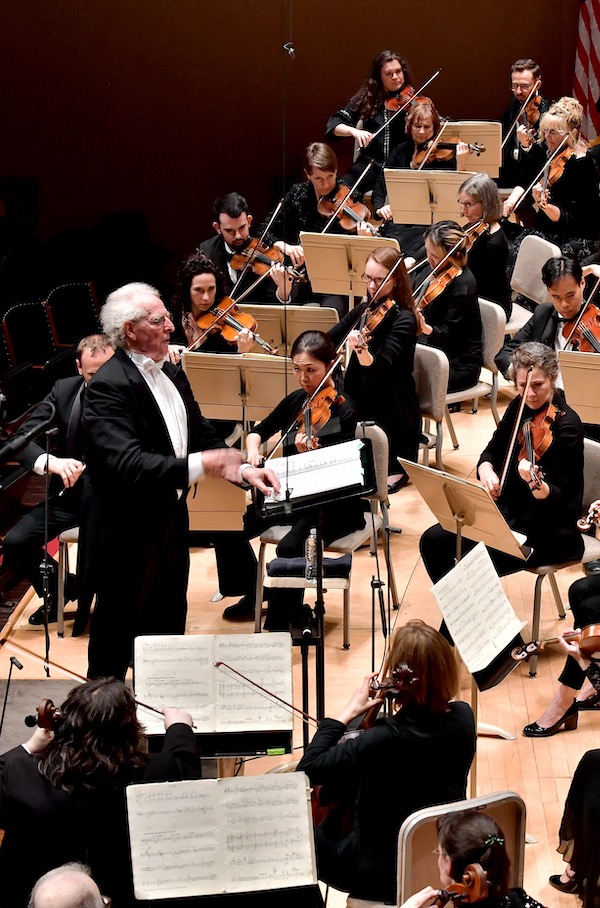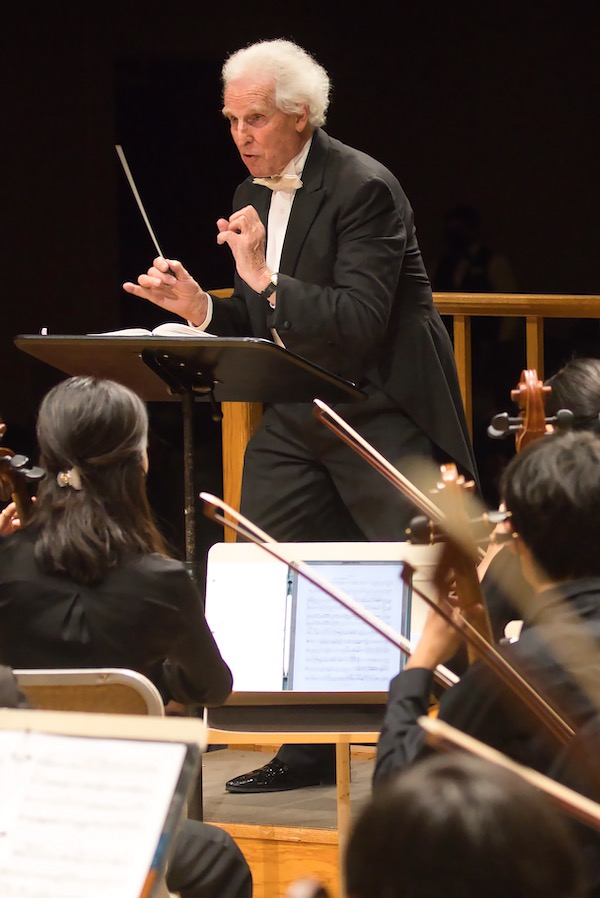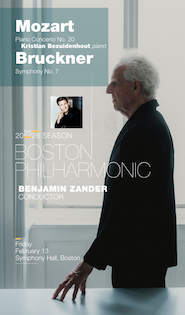Zander sees Beethoven Ninth as ideal work to crown 50 years of conducting

Benjamin Zander will conduct the Boston Philharmonic in Beethoven’s Symphony No. 9 Friday night in Boston and Sunday at Carnegie Hall. Photo: Hilary Scott
At age 83 and after fifty years as a conductor, one could hardly blame Benjamin Zander if he decided to sit back and take things easy.
Yet the Boston Philharmonic Orchestra’s longtime music director isn’t ready to settle on his laurels just yet. This Friday, he leads the Boston Philharmonic, Chorus Pro Musica, Marsh Chapel Choir, and a starry lineup of soloists in a sold-out performance of Beethoven’s Symphony No. 9 (“Choral”) at Symphony Hall. Two days later, they troop down to New York and present the same program at Carnegie Hall.
Beethoven has long been a focus for Zander and the Ninth holds a special place for him and his ensemble. It was with this piece the BPO presented their first concert at Carnegie in 1983. Forty years later, as Zander noted when we recently met at his home in Cambridge, “we’re coming full circle.”
But this current iteration of the “Choral” Symphony promises to be different from Zander’s earlier ones. The last time he conducted the work with the BPO in 2013, the focus was on tempos, specifically a rigid adherence to Beethoven’s demanding metronome markings. “I felt very strongly that we had to document the piece a certain way,” the conductor said of that effort, “and so there was a strictness to it that was maybe too much.”
Now the perspective has shifted. “I got permission to explore how I felt about [the Ninth] rather than how I was supposed to do it,” Zander offered with a cryptic twinkle in his eye when asked about his fresh tack. Fundamentally, this means a concentration on “tempo rubato,” in which orchestra and conductor are free to stretch lines and phrases much the way a pianist or chamber ensemble might.
“I haven’t seen anybody else do this [with the Ninth],” Zander allowed. “I discussed it once with [Emanuel] Ax…and he said, ‘Of course, that’s the way we play the piano.’ But it’s not the way people play orchestra.”
There are, of course, good reasons for this: among them, one pianist is easier to manage than an ensemble of 150. Yet the challenge seems to be part of the appeal for Zander, whose overriding objective is to get at the emotional core of the music rather than to satisfy purely intellectual cravings or to observe aesthetic dogmas for their own sake.
“We’ve really done such damage through intellect, through our supposed intelligence,” he noted at one point in our conversation, “and it’s all been divorced from the heart.” This Beethoven is an effort to help rectify such waywardness.
Interestingly, his latest process involves an embrace of some performance practices that have fallen out of fashion, including amending instrumentation in Beethoven’s orchestration for clarity. Purists will bristle at certain of Zander’s handful of adjustments to the score, but he holds that there are musical reasons for all of them.
“It’s so silly,” he said of one fortissimo outburst in the third movement where he added the timpani into the orchestral fabric. “The timpani’s the only one not playing. Surely, if Beethoven were scoring the piece today, he’d have included the timpani!”
(In Beethoven’s time, technical limitations meant that the timpanist couldn’t change pitches mid-movement. Invariably, if the notes didn’t fit within the harmony, the drums sat silent, regardless of the larger musical context. On the modern instrument, such adjustments are commonplace.)
Any talk of tempo elasticity with Zander also comes as a bit of a surprise. His approach to Beethoven, after all, has long been notable for its vigor and strong sense of direction. However, he assures that this Ninth won’t lose its way.
“The reason people play the opening of the Ninth Symphony’s slow movement [without regard for the metronome marking],” he explained by way of example, “is because they want it to feel very calm. With Furtwängler, the phrase lasts forever. You think it’s never going to end! And then there’s another one. Then, when it’s quoted in the last movement, he does it exactly the way Beethoven intended [without drawing it out].
“But what he hasn’t grasped, I think, is you can get enough sense of calm and peace by playing [the slow movement] just how it’s written.”
So the metronome markings haven’t been entirely eschewed: “I’ve internalized them so I don’t even have to think about them anymore,” Zander remarked several times. They just don’t dominate the conductor’s way with the piece as they once did.
Neither, it seems, does the weight of Beethoven’s shadow. “Before, I could say I was Beethoven’s devoted servant,” Zander mused. “But I don’t feel that way anymore. Now, I feel as though I’m his friend.”
That newfound comfort level is evident both in Zander’s appreciation of the man and his music.
“What’s fascinating to me—and deeply moving,” Zander noted, “is that, when he wrote this piece, he was not only stone deaf so he couldn’t hear anything, he was very ill, he was completely alone. He had no companion, he had trouble with all his relationships. He was living in a police state, and he was a passionate democrat; and he was living in circumstances that were just horrendous.
“And he wrote the most optimistic piece of music, the most life-affirming piece of music that’s ever been written. And it’s for everybody in the world, and it’s understandable by everybody even though it’s extremely complicated…every child can play it on a recorder or on the violin. That, to me, is just incredible.”
For Zander, ensuring audiences comprehend the larger musical point often involves some sort of pre-concert introduction. Both upcoming performances will include preparatory lectures with musical examples.
Illuminating this knowledge with all and sundry has been a defining aspect of Zander’s long career. The same missional focus has also been foundational for the BPO. Though the orchestra, like those the world over, was shuttered for more than a season during the pandemic, it returned in majestic form in October 2021. Zander sees a silver lining in those vacant months.
“When [the orchestra] was closed down,” he recalled, “we went on paying the players [if they requested support]. The effect of this was a…kind of gratitude that I had never experienced in the orchestra before. When we came back…I remember in that first rehearsal, I’d never felt so much warmth…coming from the orchestra out of gratitude for the fact that we’d stood by them.”
Their music making, which has always reflected a special bond between conductor and instrumentalists, has, indeed, taken on an uncommon sheen these last two years. Now, the pairing (and guests) stand ready to scale what Zander considers the summit of the canon, culminating in the ensemble’s fifth appearance in the hall where Mahler, Toscanini, and Bernstein once reigned. “[We’re in] a good place right now, I feel,” Zander said. “And it’s a huge privilege to go to Carnegie Hall—that’s a big deal.”
Despite evidence to the contrary, the octogenarian remains optimistic about the future (“I think there are so many really responsible and smart and caring people, particularly in the younger generation”). And Beethoven fulfills a vital role in his Weltanschauung.
“Mozart makes you feel that everything is right in the world,” Zander said at one point. “And Beethoven makes you feel that you can do something to make it right. He gives you courage to go beyond where you are. And he makes everybody feel that way.
“Nobody comes out of Beethoven not inspired, energized, or hopeful. It’s amazing. What a gift to the world.”
Benjamin Zander leads the Boston Philharmonic in Beethoven’s Symphony No. 9 with soprano Liv Redpath, mezzo-soprano Ashley Dixon, tenor Nicholas Phan, and baritone Alfred Walker, the Chorus Pro Musica and the Marsh Chapel Choir at 8 p.m. Friday at Symphony Hall and 3 p.m. Sunday at Carnegie Hall. bpo.org; carnegiehall.org
Posted in Articles






Posted Feb 28, 2023 at 2:31 am by Robert Werblin
The 9th is THE, or one of the, example of the ultimate creative ability of the human species. It might, someday, serve to convince an advanced “invading” species that we should not be annihilated.